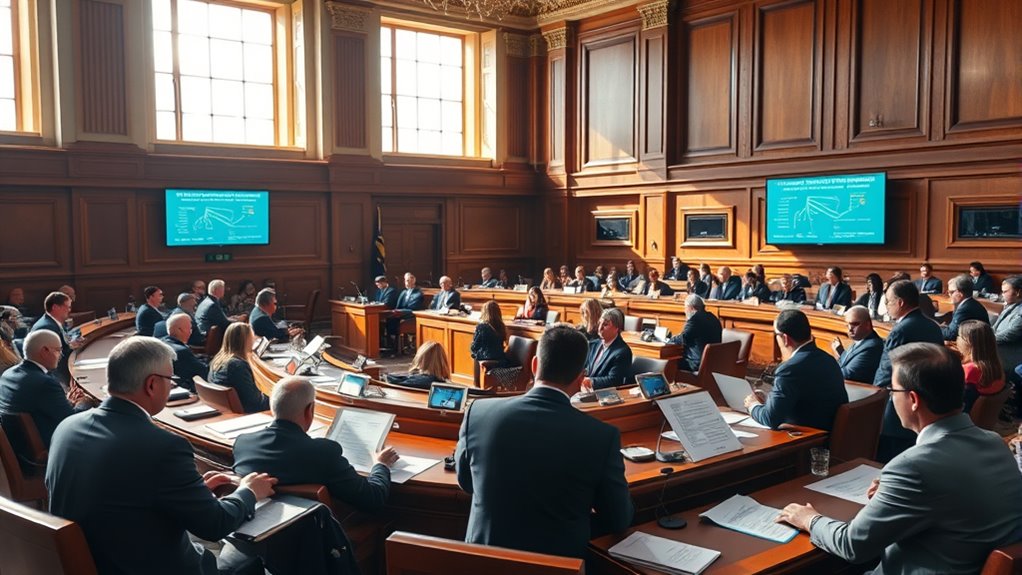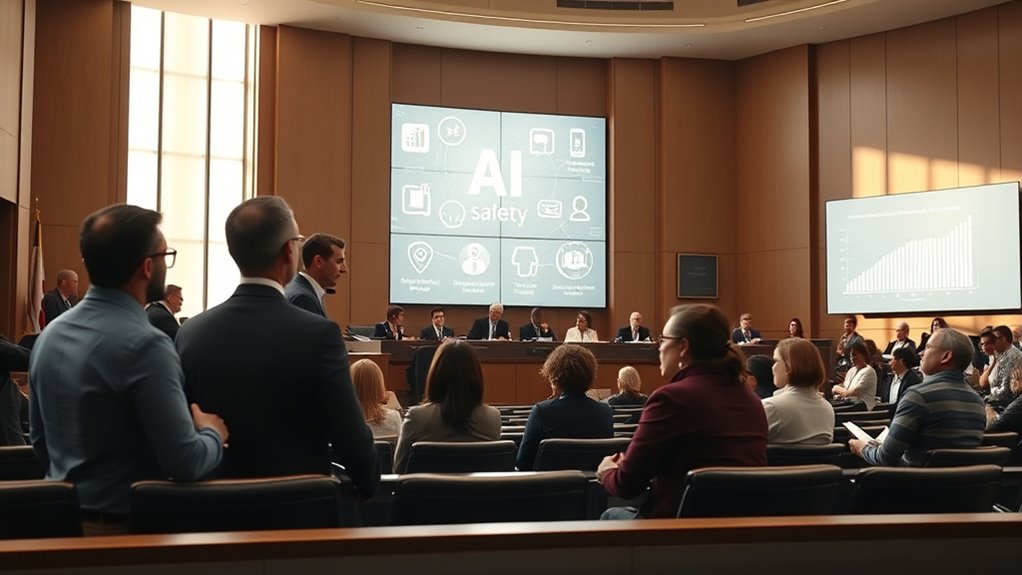California’s new AI safety law requires you to follow strict standards for developing and deploying AI, especially in sensitive areas like healthcare and justice. You must test AI systems thoroughly to prevent bias and discrimination, while also safeguarding data privacy with transparency and security. Organizations are held responsible for potential harms and privacy breaches, encouraging ongoing oversight. If you want to understand how these rules will shape AI use in California, there’s more to contemplate.
Key Takeaways
- Establishes strict testing and ethical standards for AI systems used in sensitive sectors like healthcare and criminal justice.
- Enforces transparency and user rights regarding data collection, storage, and privacy.
- Holds organizations accountable for AI-related harms, with penalties for violations or biases.
- Promotes ongoing oversight through regular audits to ensure compliance and adaptation to technological advances.
- Aims to align AI development with societal values, emphasizing fairness, safety, and privacy protections for Californians.

Have you wondered how California plans to regulate the rapid growth of artificial intelligence? The state’s new AI safety law aims to address this by establishing clear guidelines that prioritize responsible development and deployment. Central to this legislation are concerns around AI ethics and data privacy, which are now at the forefront of regulatory efforts. As AI becomes more integrated into daily life, California recognizes the importance of ensuring these technologies are aligned with societal values and individual rights. The law mandates that AI systems used in sensitive areas—such as healthcare, employment, and criminal justice—must undergo rigorous testing to prevent bias and discrimination. This proactive approach helps safeguard against unintended consequences, ensuring that AI serves everyone fairly and equitably.
Data privacy is another cornerstone of the law. You’re likely aware of how AI systems often rely on vast amounts of personal data, which raises serious privacy concerns. California’s legislation enforces strict standards for data collection, storage, and use, requiring organizations to be transparent about how they handle personal information. Companies must now implement robust security measures to protect user data from breaches and misuse. Additionally, the law grants individuals greater control over their data, allowing them to access, correct, or delete information held by AI systems. This shift empowers you to have more say in how your personal data is utilized, aligning with broader privacy rights that Californians value. Moreover, understanding the technical aspects of emailing can help organizations ensure compliance with these privacy standards while engaging users effectively.
The law also emphasizes accountability, holding organizations responsible for the ethical implications of their AI products. If an AI system causes harm or violates privacy rights, companies could face penalties or be required to make necessary adjustments. This accountability fosters a culture of ethical responsibility, encouraging developers to prioritize safety and fairness from the outset. Moreover, California’s approach encourages ongoing oversight, with regular audits and assessments to ensure compliance and adapt to evolving AI technologies.
Frequently Asked Questions
How Will This Law Affect Small AI Startups?
This law may create additional innovation hurdles for your small AI startup, making it harder to secure funding and develop new ideas quickly. You might face stricter regulations that delay product launches or increase compliance costs. While it could limit some rapid experimentation, it also encourages safer, more ethical AI development. Staying informed and adaptable will help you navigate these changes and continue innovating despite the new legal landscape.
Are There Penalties for Non-Compliance?
Yes, there are penalties for non-compliance. You’ll face penalty enforcement, which can include fines and other enforcement actions if you don’t adhere to the law’s requirements. These penalties aim to motivate compliance and guarantee safety standards are met. Keep in mind, non-compliance also increases your compliance costs, making it essential for you to stay updated and fully comply with all provisions to avoid costly penalties.
Will the Law Apply to International AI Companies?
Yes, the law applies to international AI companies if they operate within California or target California consumers. You need to take into account international compliance because cross border regulation is a key aspect. If your AI services impact California residents, you’ll likely have to adhere to the law’s provisions, even from outside the state. Staying informed about these rules helps you avoid penalties and ensures your AI solutions meet California’s safety standards.
How Does This Law Compare to Federal AI Regulations?
You’ll find that this law differs from federal regulations by emphasizing state-specific standards, which may cause regulatory overlap. While federal preemption could restrict California’s authority, the law aims to set unique safety rules for AI within the state. As a result, you might face a complex landscape where state and federal rules interact, requiring you to stay informed to ensure compliance across jurisdictions.
What Are the Enforcement Mechanisms for the Law?
Imagine a vigilant lighthouse keeper, always watching for storms—this is how enforcement procedures work in this law. You’ll face compliance monitoring through regular audits and reporting requirements. If violations occur, authorities can impose fines or sanctions. The law’s clear enforcement mechanisms make certain companies stay on course, much like a lighthouse guiding ships safely, making sure AI systems adhere to safety standards and protecting public interests effectively.
Conclusion
This new AI safety law marks a monumental leap forward, setting a gold standard that could influence global standards overnight. By prioritizing transparency and accountability, California empowers you to trust AI technologies more confidently than ever before. As the most ambitious legislation of its kind, it’s clear this law will reshape the future of AI regulation worldwide. Embrace these changes—you’re witnessing a historic moment that could redefine technological progress for generations to come.










